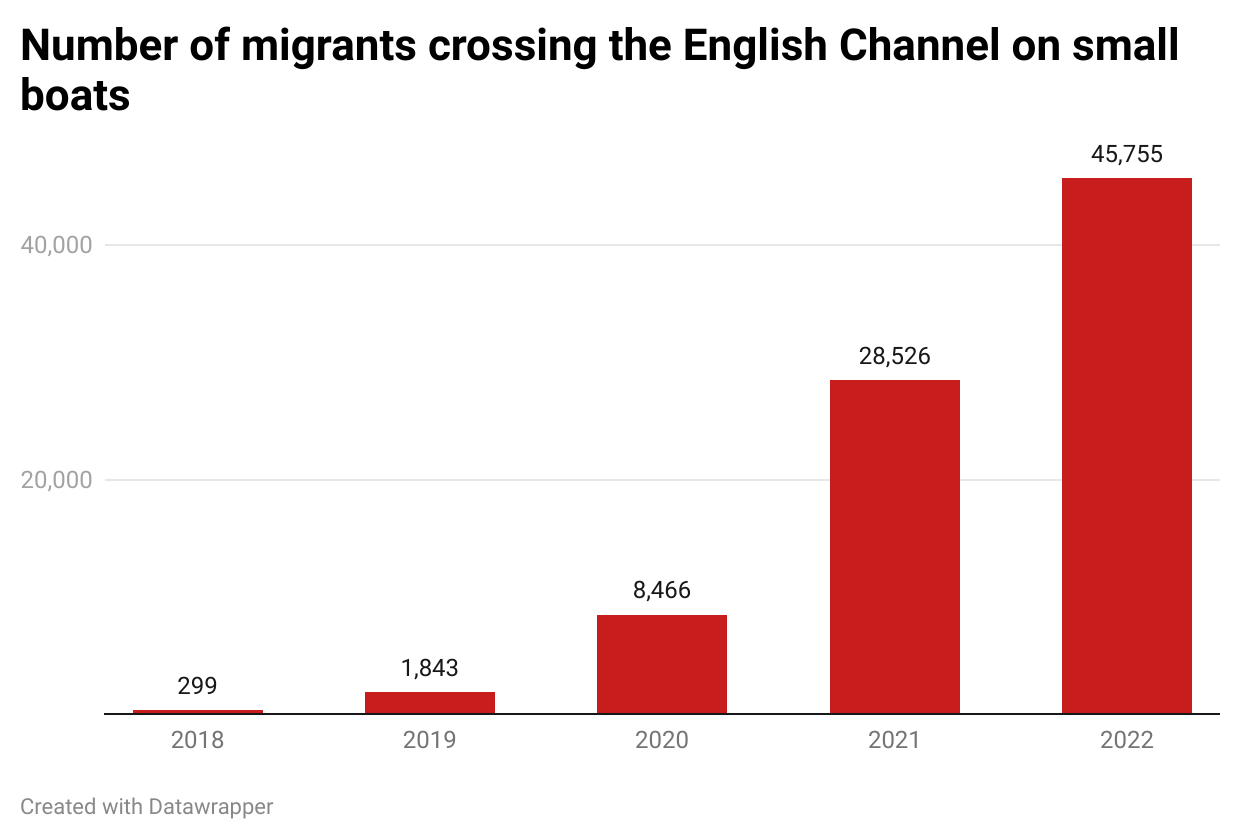Home Office expects to support up to 140,000 asylum seekers after record Channel crossings
Home secretary’s lawyers tell High Court situation is ‘emergency’ as council battles asylum camp at RAF base

The Home Office expects to be supporting up to 140,000 asylum seekers by the end of this year, Suella Braverman’s lawyers have told the High Court.
A barrister also revealed the government is “working on estimates of up to another 56,000 people arriving on small boats this year”, which would be a new record and a rise of more than a fifth on 2022.
The disclosures were made as the home secretary’s legal team defended her attempt to declare the current shortage of asylum accommodation an “emergency” to bypass normal planning permission.
A planning rule known as “Class Q” is being used in a bid to develop the former RAF Wethersfield base in Essex into a camp housing 1,700 asylum seekers using existing buildings and “modular units”.
Home Office barrister Paul Brown KC said it was Ms Braverman’s “position that the situation generally is an emergency”.
He pointed to the increase in Channel crossings, record asylum backlog, government schemes for Afghan and Ukraine refugees, previous overcrowding at the Manston processing facility and a shortage of hotel places following the end of the Covid pandemic.
Mr Brown said there was “a need to find a longer-term solution to what happened at Manston”, when thousands of people were unlawfully detained in the autumn and an asylum seeker died of diphtheria.
“The flow of small boats has not stopped, nobody has a crystal ball but the secretary of state at the moment is working on estimates of up to another 56,000 people arriving on small boats this year,” he added.
“If that happens the number of people likely to require accommodation and subsistence support is expected to rise from the current 109,000 to up to 140,000.”
The Home Office is legally required to prevent asylum seekers becoming destitute while considering their claims, and a record backlog has built up because of attempts to declare people arriving on small boats “inadmissible” without anywhere to deport them to.

More than 160,000 people were awaiting an initial decision by the end of last year, of whom 110,000 were in receipt of government support, and ministers rebuffed calls to lift a legal ban on working to support themselves.
Mr Brown argued that the situation “threatens homelessness”, which is one of the thresholds for declaring an emergency under planning laws, “if the secretary of state cannot provide accommodation”.
“If they are vulnerable or destitute they are more likely to suffer illness or death,” he added. “There was a particular emergency at Manston and there is a very real anticipation that the situation, unless we can find a solution, will get worse.”
Mr Brown suggested that hotels may withdraw from Home Office contracts because they want other business, making the asylum seekers living there homeless, but provided no examples of that happening.
Written arguments by Home Office lawyers said that “whether a state of affairs constitutes an ‘emergency’ is solely a matter for the government department exercising the Class Q right”.
Braintree District Council is applying for an injunction to stop the Wethersfield development and force the government to apply for planning permission in the normal way, and conduct the required consultation with the public and local authorities.
Barrister Wayne Beglan told Wednesday’s hearing that the current situation was not an emergency under the meaning of the law used, and that ministers’ push to use military bases was “cost-driven”.

He questioned whether the Home Office’s desire to cut spending on hotels “creates an emergency situation within the meaning of [the law] such that all of the procedural safeguards identified are bypassed”.
Written submissions from the council argued that the intent of the law was to “cover circumstances such as a natural disaster or a security incident” where there was a threat of loss of life. “It does not encompass a nationwide lack of provision of housing, of whatever description,” the document added.
“Mere pressure on resources is not an emergency. These are policy issues which are addressed, from time to time, by evolving policy decisions.”
The home secretary’s lawyer said that if the High Court finds against the Home Office, and rules that the current situation is not an emergency under the relevant law, the use of RAF Wethersfield will “cease”.
But Mr Brown also told the court that the government is planning to use the same “Class Q” planning process for other planned asylum camps, including one at RAF Scampton in Lincolnshire.
Mr Justice Waksman reserved his judgment to a later date, and Home Office gave a formal undertaking that while development will continue, no asylum seekers will be moved to Wethersfield until the judgment or 3 May, whichever is sooner.
The announcement of the accommodation plans last month sparked a furious backlash from Conservative MPs and councils, who argue they have not been properly consulted and that the chosen sites are unsuitable.
Under the separate Levelling-up and Regeneration Bill, the government is giving itself powers to bypass normal planning permission for asylum accommodation and other urgent developments “of national importance”.
New laws being considered by the House of Lords would allow the housing secretary, currently Michael Gove, to take decisions on the use of government-owned land instead of local authorities.






Join our commenting forum
Join thought-provoking conversations, follow other Independent readers and see their replies
Comments